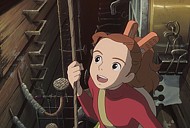
The Secret World of Arrietty
Studio Ghibli has the best track record of any anime production house, period. Their films are legendary. The only blemish on that score is Tales From Earthsea, the enjoyable but seriously flawed film from Goro Miyazaki, son of the legendary Hayao Miyazaki. It was Goro's first film, but because of his name and the studio's reputation, huge expectations led to big disappointments. Based on his perceived failure, a new question arose: was this a fluke, or had Ghibli lost the ability to shepherd new directors into the fold?
Thankfully, first-time helmer Hiromasa Yonebayashi proves himself more than capable of handling the Ghibli mantle with The Secret World of Arrietty. Though he had a screenplay and planning help from the elder Miyazaki, his years of work for the studio prove fruitful in this charming film that assures that the Ghibli name will survive the looming retirement of the anime great.
The Secret World of Arrietty is based on the book The Borrowers by Mary Norton. (The unfortunate name change is likely due to rights issues in the US.) Our story revolves around the Clock family, "borrowers" that stand only a few inches high. While they are able to fashion for themselves a nice home with all the necessities, they live in a world where insects are like horses and hungry birds are a recipe for disaster. To survive, they wind up taking small things they need from the giant human "beans" that rarely miss the cube of sugar or sewing pin they skitter off with. They live in the shadows of a home that's rather rural with plenty of hiding places.
Arrietty's a 13-year-old girl full of curiosity about the world around her, which means dodging the local cat to bring home leaves for her mother's tea. She's about to go on her first official "borrowing" with her dad when there's a new arrival...a young man named Shawn who's been sent out to the country to get some rest from his long-standing illness. While Shawn won't be chasing after anybody, the very fact that he spots Arrietty in a bush means that they are in danger. Because humans have a nasty habit of trying to exterminate that which they can't see and understand...
Unlike the works of Isao Takahata, the other major director at Ghibli, one could be forgiven thinking that this was another Miyazaki film. From the character design on down, it has the appearance of one. Is that a bad thing? In my opinion, not at all...Miyazaki is a unique talent, and those few foolish enough to ape his style have failed miserably in the past. Yonebayashi delivers a film that equals the master, and for a first outing, that's pretty astounding.
Tonally, Arrietty has a striking similarity to My Neighbor Totoro. Both occur in rural settings with only a handful of characters. Both are deeply in love with nature for its own sake. And both regard a plot as secondary, a compilation of occurrences involving extraordinary persons (or creatures) that nevertheless happen organically. Where Arrietty is different is in its eye for detail in miniature. I found myself fascinated primarily by Yonebayashi's view of what it would be like to be a tiny person in a gigantic world.
Something else that struck me about Arrietty was how intentionally calm it is. At certain times, conceptually Arrietty reminded me of The Secret of NIMH, itself a great animated motion picture. The concept of scale is very important to NIMH as well. However, NIMH is a surprisingly intense film where lead character Mrs. Brisby is constantly put in peril. That sense of danger is here in Arrietty too, but not in such a way as to frighten young children. When compared with the preview trailers for other children's films that tend toward the manic, Arrietty is deliberately paced. Those elements might bore some -- unfortunately, it was clear that a few adults in my screening seem to have been expecting the next coming of Transformers -- but a thoughtful child will find much to explore here without fear or rush.
The only ding I could really make on the film is the situation with Shawn. He's a gentle soul who would love nothing better than to help the borrowers live their lives out with ease rather than burden. But the conceit of having a child go out to the country to deal with illness -- I haven't heard of that in generations. (The original book was written in the 1950s, so maybe that's why it still contains the concept.) Even then, we have to be told he's sick; it doesn't really feature much into the film except at a couple of key moments. The dub makes Shawn sound more monotone than ill. It doesn't distract from the film much, but did I really buy Shawn's character? Not enough for me to give the movie a perfect score.
Meanwhile, getting back to the dub...the US version is quite good with the possible exception of Shawn's character. It also shows why great actors can bump up the quality of a production. Carol Burnett only delivers a few lines throughout the film as a crafty maid who suspects that something is afoot with the minor things missing around the house. However, Burnett takes lines that would have been throwaways and makes them humorously entertaining. She's a treat, and I only wish that her character had more to say.
The Secret World of Arrietty is a beautifully rendered film that may be too simple and warm to become the next instant anime classic, but is well worth your time to see. While it doesn't prove that Hiromasa Yonebayashi is the next Miyazaki, it does make him a director to watch. And for those of us with young children trying to find films that are nurturing rather than ADD, it's perfect.
The Secret World of Arrietty -- minor peril -- A

